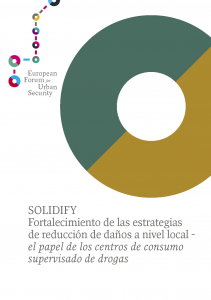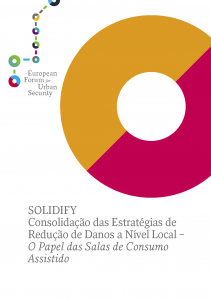Context
The project will focus on the implementation and sustainability of the Drug Consumption Rooms in several European cities and assess their impacts on the territory.
These measures pursue objectives of both public health and safety, public tranquility and social cohesion. As highlighted by the European Monitoring Center for Drugs and Drug Addiction (EMCDDA, reports “European report on drug consumption rooms” 2004 and 2016 or the European Harm Reduction Network (Euro HRN), they can reduce open consumption and the problems that arise (disturbances, delinquency, trafficking) if they are part of a comprehensive local strategy. Yet, they also give rise to negative representations and phenomena of rejection known as the “Nimby phenomenon” (Not in my backyard) which refers to opposition by local populations over the establishment of such facilities near their home that could prevent their installation or harm their operation.
However, several studies show public acceptance is considerably high in neighborhoods where these structures were set up when all local actors, including the local residents, were involved in cooperation and communication links (EMCDDA: Drug consumption rooms: an overview of provision and evidence IDPC: low-risk consumption rooms: evidence and practice).
The conditions for the success and sustainability for this type of system require consultation and acceptance by all actors (health, police, judicial, associative actors) as well as inhabitants and traders in a territory in order to make them adhere to the objectives involved in the assessment of the impacts on the territory and as appropriate adjust the means implemented. Cities hosting this type of arrangement have important work accompanying supporting structures to help them settle on a territory, meet and consult all partners and local actors and to assess the impacts on the territory.
Several studies have been conducted over the installation in neighborhoods. However, these studies date back to the 1990’s and mainly concern North European cities in Switzerland, the Netherlands and Germany. The project involving cities from different EU countries will focus on different socio-geographic contexts. Moreover, since the first studies many variables have changed, such as scenes of drug use, hyper-marginalization of certain populations and increased migration.
Objectives
The general objective of this project is to better equip cities which have drug consumption rooms, both in order to help them accompany and facilitate the installation of structures offering this scheme in any given territory and to evaluate the rooms’ impacts in terms of localised reduction of negative impacts.
The project will provide for the completion of a collective cross-analysis of the installation and evaluation process of a drug consumption room and thereby equip local authorities to promote the installation of health facilities which provide these schemes. The project will also identify indicators for assessing short, medium and long-term impacts on the territory.
Furthermore, the project will enable the sharing of practices between experienced partner cities that have already tested and implemented drug consumption facilities and those partner cities currently considering and/or going through the process of installing this type of scheme, which will allow these cities to benefit from the recommendations and critiques of their peers. It will also strengthen partnerships and coalitions at the local level, between local authorities and civil society organizations.
Activities
A shared methodological foundation will be designed in order to promote analysis and the contextualisation of specific local circumstances. This will enable the presentation of varied experiences and will facilitate the evaluation of drug consumption rooms and their impacts on the territories in which they are established (issues involving security and delinquency in proximity to the site, feelings of insecurity, improving cleanliness, dialogue and acceptance of the scheme by residents, shopkeepers, public authorities…). The methodological tools will be filled out by the cities prior to each visit and then completed by field observations from peers and experts during the time on the ground.
Following the visits, the project partners and experts will work on the definition of qualitative and quantitative criteria and the construction of an assessment grid which will provide for evaluation of the installation process of a drug consumption room and its short- and long-term impacts on the territory.
A collection of recommendations and practices will be produced and presented at a final event (colloquium) which will gather the project partners and the organisations who host these schemes in the partner cities. This event will be open to members and partners of the European Forum for Urban Security (Efus), including local authorities (elected officials and technicians), government representatives, European Union representatives, scholars, and specialised CSOs and civil society representatives. The members of the European Commission’s Civil Society Forum on Drugs, of which Efus has been a member since 2008, will be invited, as well as the partners of the Democracy Cities and Drugs network. The event will be organised in Lisbon in the second semester 2019, synergies with the EMCDDA will be sought.
|
Final conference of the Solidify project |
Publication



Partners
- European Forum for Urban Security (FR) – project leader
- City of The Hague (NL)
- City of Lisbon (PT)
- City of Liège (BE)
- Institute for health research and development Utrip (Institut za raziskave in razvoj Utrip zavod) (SI)
- Brussels Prevention & Security (BE)
- City of Augsburg (DE)
- City of Essen (DE)
- Association for well-being and development (Asociación bienestar y desarrollo) (ES)
- City of Mannheim (DE)
- Agency for Public Health of Barcelona (Agencia de Salut Publica de Barcelona) (ES)
- City of Paris (FR)
- City of Strasbourg (FR)
Call for Experts
Click here to access the Solidify Call for Experts
Duration
January 2018 – Mars 2020
Financing
![]() Solidify is funded at 80% by the European Commission – Justice Programme Supporting Initiatives in the Field of Drugs Policy
Solidify is funded at 80% by the European Commission – Justice Programme Supporting Initiatives in the Field of Drugs Policy
Contacts
Carla Napolano, Deputy Director of EU Programmes and Network Life: napolano@efus.eu
Moritz Konradi, Programme Manager: konradi@efus.eu






